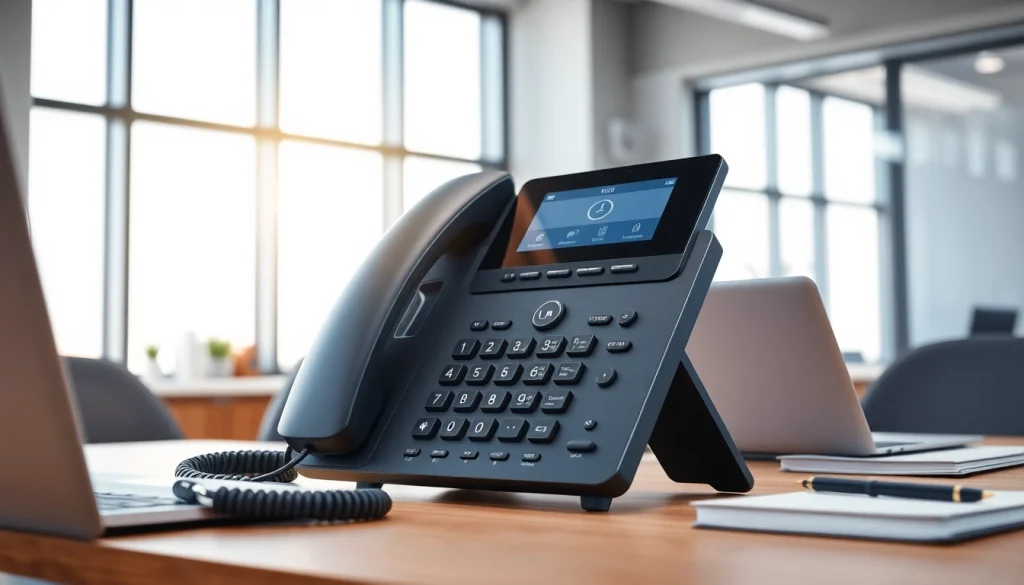Understanding the IP Phone
What is an IP Phone?
An IP Phone is a device that uses Voice over Internet Protocol (VoIP) technology to transmit voice calls over the internet rather than through traditional telephone lines. Unlike standard telephones, which rely on a landline network, IP Phones enable users to make voice and video calls using an internet connection. This shift from analog to digital technology has revolutionized communication, offering enhanced flexibility, scalability, and functionality.
At the core of an IP Phone’s functionality is the use of protocols that convert voice signals into digital data packets. This digital data is sent across the internet and can be received by another IP Phone, allowing for seamless communication between devices, regardless of location. A notable feature of today’s IP Phones is their ability to support various communication modes, such as voice, video conferencing, and even texting, all through the same device. For businesses seeking efficient communication solutions, understanding the robust capabilities of an IP Phone is crucial.
How IP Phone Works
The operation of an IP Phone is fairly straightforward yet technically sophisticated. When a user speaks into the device, their voice is converted into digital signals by an onboard codec. These signals are then sent in the form of data packets over the internet to the recipient’s IP Phone, which converts the digital signals back into audible sound. This process occurs in real-time, making conversation nearly instantaneous.
Furthermore, IP Phones can connect via Session Initiation Protocol (SIP), which assists in establishing and terminating voice media sessions. SIP enables features like call forwarding, voicemail, and conferencing, making IP Phones a versatile communication tool for both individuals and businesses. The requirement for a stable internet connection ensures that users can enjoy high-quality voice calls with minimal latency, thereby enhancing the user experience.
Key Features to Look For in IP Phone
When considering an IP Phone, there are several features that can significantly enhance communication. Some essential features include:
- High Definition (HD) Voice Quality: Ensures that calls are crisp and clear, significantly reducing misunderstandings.
- Video Capabilities: Enables face-to-face communication through video calls, enhancing collaboration.
- Programmable Buttons: Allows users to customize their phone interface, making it easier to access frequently dialed numbers or features.
- Interoperability: Ensures the IP Phone can easily connect with existing systems and devices.
- Caller ID and Call Management Features: Manages calls efficiently and provides visibility into incoming communications.
By selecting an IP Phone equipped with these key functionalities, users can significantly improve their productivity and communication efficiency.
Benefits of Using IP Phone for Businesses
Cost Efficiency of IP Phone
One of the primary advantages of implementing an IP Phone system is its cost efficiency compared to traditional telephony systems. Since IP Phones use the internet to transmit calls, businesses can significantly reduce their communication expenses, particularly on long-distance and international calls. VoIP services often come with lower monthly fees, allowing businesses to save on operational costs over time.
Additionally, the scalability of IP Phone systems means that businesses can easily add or remove lines without substantial investment in hardware or infrastructure. This adjustability is crucial for organizations that experience fluctuations in team size or have seasonality in their communication needs.
Enhanced Communication Capabilities
IP Phones provide enhanced capabilities that far exceed those of traditional phone systems. From advanced call management features to the integration of video calling and conferencing, IP Phones facilitate richer communication channels within organizations. Teams can share presence information, communicate via instant messaging, and engage in video meetings with ease.
Moreover, the integration of customer relationship management (CRM) tools with IP Phones allows for a more streamlined approach to customer interactions. Employees can access customer information during calls, leading to better customer service and satisfaction.
Integration with Existing Systems for IP Phone
Another compelling benefit of IP Phones is their ability to integrate seamlessly with existing business systems. Most IP Phones support integration with various software and platforms, including CRM systems, productivity tools, and mobile applications. This interoperability ensures that businesses can leverage their existing technologies while maximizing the functionality of their IP Phones.
Furthermore, companies can implement unified communications solutions, combining voice, video, messaging, and conferencing into a single, efficient platform. This convergence enables teams to collaborate more effectively and enhances overall productivity.
Common Challenges When Implementing IP Phone
Network Requirements for IP Phone
Implementing an IP Phone system comes with its set of challenges, primary among them being network requirements. Quality voice transmission requires a reliable internet connection with adequate bandwidth to accommodate voice data packets. Businesses must assess their network capabilities and may need to invest in upgrades or dedicated internet lines to ensure optimal performance.
Additionally, network congestion can lead to latency and poor call quality. Implementing Quality of Service (QoS) protocols can help prioritize voice traffic over other types of data on the network, thereby enhancing call quality and reliability.
Security Concerns with IP Phone
Security is a significant concern for organizations adopting IP Phone systems. Because calls are transmitted over the internet, they can be susceptible to hacking, eavesdropping, and various cyber threats. Organizations must implement robust security measures, including encryption protocols, secure networks, and regular software updates, to protect their communication infrastructure.
Educating employees about potential phishing attacks and other common security threats is paramount in safeguarding communication systems against unauthorized access.
User Adaptation to IP Phone Technology
Transitioning to an IP Phone system may pose a challenge as employees may require training to familiarize themselves with new technology. Resistance to change is natural, and organizations should invest in comprehensive training sessions to educate users on the benefits and features of IP Phones.
Providing ongoing support during the transition period can facilitate smoother adaptation and encourage users to embrace the benefits offered by IP Phone technology.
Best Practices for Choosing IP Phone
Assessing Business Needs for IP Phone
When selecting an IP Phone system, it is crucial to assess your business needs thoroughly. Organizations should evaluate their size, communication requirements, and team collaboration dynamics to determine the most appropriate solution. Conducting a needs assessment can help identify the necessary features and capabilities that the chosen IP Phone should possess.
Consideration of the user experience is also essential; ensure that selected devices are user-friendly and align with the habits and preferences of your team. This alignment can significantly enhance user satisfaction and productivity.
Evaluating Brands and Models of IP Phone
Not all IP Phones are created equal. It is important to evaluate different brands and models based on quality, reputation, support, and warranty offerings. Researching customer reviews, technical specifications, and feature sets will inform better decision-making.
Engaging with vendors and seeking demos can provide valuable insights into how specific IP Phones operate in real-world scenarios, helping businesses make informed choices.
Considerations for Maintenance of IP Phone
Maintenance is a critical aspect of operating an IP Phone system. Businesses should develop a comprehensive maintenance plan that includes regular software updates, hardware inspections, and performance evaluations. Understanding the lifecycle of the chosen devices can also inform replacement planning, ensuring that the organization remains equipped with up-to-date technology.
Additionally, establishing a relationship with a reliable vendor or service provider can enhance the ease of maintenance and provide access to expert support when required.
Future of IP Phone Technology
Trends Shaping IP Phone Market
The future of the IP Phone market is shaped by several emerging trends. One significant trend is the increasing adoption of cloud-based communication solutions, which offer enhanced flexibility and cost-effectiveness. Organizations are moving towards Unified Communications as a Service (UCaaS) models that provide integrated communications without the need for extensive on-premises equipment.
Additionally, advances in artificial intelligence are influencing IP Phone functionality, delivering smarter call handling, automated scheduling, and improved personalization.
Innovative Features on the Horizon for IP Phone
The technological landscape of IP Phones is continuously evolving, with innovative features set to enter the market. Expect features such as enhanced voice recognition, integration with virtual assistants, and improved user interfaces that leverage augmented reality or virtual reality to facilitate more immersive collaboration experiences.
Furthermore, as remote work continues to be a norm, IP Phones will increasingly integrate seamlessly into mobile platforms, allowing employees to communicate anytime, anywhere with ease.
Impact of IoT on IP Phone Development
The Internet of Things (IoT) is positioned to revolutionize the IP Phone landscape by enabling devices to communicate with one another more effectively. This integration will lead to the creation of smarter office environments where IP Phones are interconnected with various office automation systems, enhancing overall functionality and user experience.
As the lines between devices blur, businesses will gain opportunities to create more efficient communication setups that can adapt to their evolving needs.







